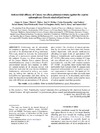Please use this identifier to cite or link to this item:
http://hdl.handle.net/10553/55036
| Title: | Anticoccidial efficacy of Canary rue (Ruta pinnata) extracts against the caprine apicomplexan Eimeria ninakohlyakimovae | Authors: | López, Adassa M. Muñoz, María C. Molina Caballero, José Manuel Hermosilla, Carlos Taubert, Anja Zárate, Rafael Hildebrandt, Inna McNaughton-Smith, Grant Eiroa, José Luis Ruiz Reyes, Antonio |
UNESCO Clasification: | 3109 Ciencias veterinarias | Keywords: | In-Vitro Coumarin Tenella Bovis Disinfectants, et al |
Issue Date: | 2019 | Journal: | Journal of Animal Science | Abstract: | Continuous use of anticoccidial treatments against Eimeria infections has resulted in the development of drug resistance. This study aimed to evaluate the anticoccidial efficacy of a methanolic extract derived from the endemic Canary rue (Ruta pinnata) plant of the Canary Islands, Spain, against Eimeria ninakohlyakimovae using in vitro assays. Freshly unsporulated oocysts were exposed to different concentrations of R. pinnata extract and thereafter evaluated for sporulation inhibition. Additionally, anticoccidial activity was examined by testing the viability of the E. ninakohlyakimovae sporozoites and their ability to infect bovine colonic epithelial cells after incubation with different concentrations of R. pinnata plant extract. The inhibition of oocyst sporulation by the extract was both time and concentration dependent, with certain combinations affording the same levels of sporulation inhibition as formaldehyde used as positive control (P < 0.001). Moreover, concentrations >0.1 mg/mL also affected not only the viability of the sporozoites but also their cell invasion capacity (P < 0.001). Altogether, these results show that methanolic fruit extracts from R. pinnata have important anticoccidial activity against oocysts and sporozoites of Eimeria. The potential efficacy of the extracts against other animal/human parasites remains to be elucidated, and further studies are needed to better understand its mode of action against coccidian parasites. | URI: | http://hdl.handle.net/10553/55036 | ISSN: | 0021-8812 | DOI: | 10.1093/jas/sky389 | Source: | Journal of animal science [ISSN 0021-8812], v. 97 (1), p. 101-110 |
| Appears in Collections: | Artículos |
Items in accedaCRIS are protected by copyright, with all rights reserved, unless otherwise indicated.
